Selecting the best SEO tool can propel development and differentiate companies in the busy digital industry. Two industry titans, Semrush and Moz, regularly rank highest on the charts, but who really shines? Dive in as we dissect the unique characteristics of every tool:
- Semrush: Provides professionals with a whole suite for data-driven tactics and is most known for its thorough keyword analytics and domain insights.
- Moz: Emphasizing a simple interface, it offers on-page SEO advice and in-depth backlink research.
Although both technologies have advantages, every digital marketer who wants to expand their strategy must first comprehend their variances. And keep in mind the importance of Conversion Rate Optimization (CRO) and User Experience (UX) even as you are improving the SEO of your website. In this regard, plerdy tool becomes a great friend for people trying to increase user involvement and convert more. Go deeply, assess, and let the tools speak for themselves.
Evaluate Keyword Research in Semrush and Moz
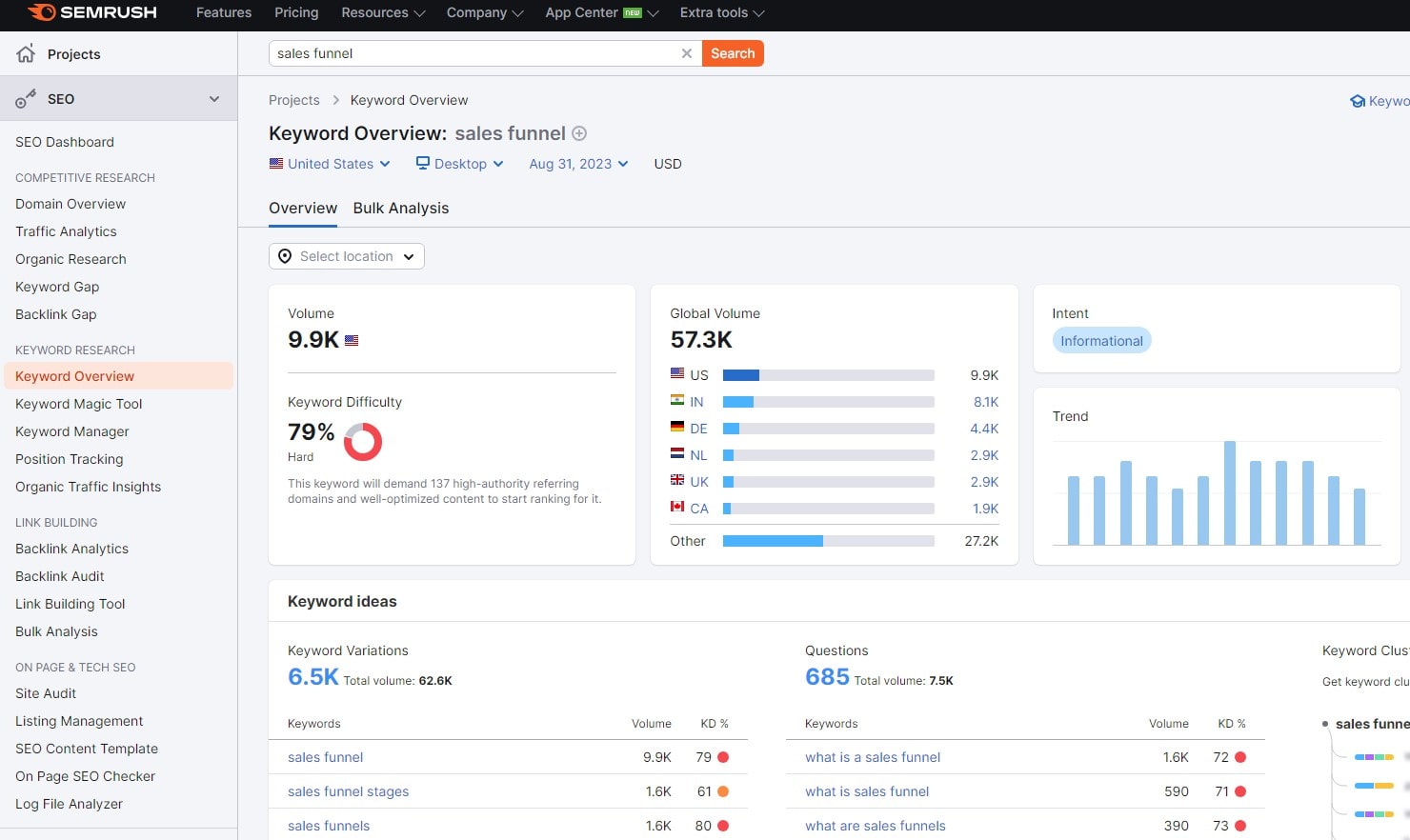
Examining two main SEO tools, Semrush and Moz, closely in terms of their functions, efficiency, and focused capabilities helps one evaluate keyword research. For companies, bloggers, and marketers equally looking at, planning, and using keyword-driven content, both technologies provide creative alternatives.
Regarding Semrush, its large keyword database provides insights on search traffic, keyword difficulty, and click-through rates. Semrush’s strongest suit is its ability to spot long-tail keywords, perfect for particular niches like:
- Health and Wellness: Examining hot wellness subjects
- E-commerce: Finding search phrases particular to a product
- Local Businesses: Finding geo-specific searches
Conversely, Moz uses clever algorithms to offer not only keyword recommendations but also a more complete picture of how terms behave in the competitive environment. From broad industry terms to niche-specific words like organic farming or handcrafted goods, Moz provides a customized experience to find and provide top priority for ideal keywords.
Both solutions let users explore several indicators and offer a road plan to generate natural traffic, boost site exposure, and encourage interaction. Nevertheless, the approaches differ clearly:
- Semrush: Focusses on thorough data-driven insights and aids content optimization by organic research, gap analysis, and SERP features.
- Moz: Uniquely simplifies the decision-making process by using its Keyword Explorer to combine volume, difficulty, opportunity, and potential into an understandable Priority Score.
One thing that distinguishes this comparison is that although using different approaches, Semrush and Moz both have strong keyword research powers. While Moz adds a layer of simplicity, trying for a larger user base, Semrush leans more toward a granular data-driven strategy. Selecting between these tools can be a customized choice depending on personal needs, industry emphasis, and particular niches based on the highlighted above different functions and methods. Depending on how comprehensive or broad they wish their keyword analysis to be, professionals in sectors such automobiles, culinary arts, or IT startups could find one tool more enticing.
Assess Backlink Analysis in Semrush and Moz
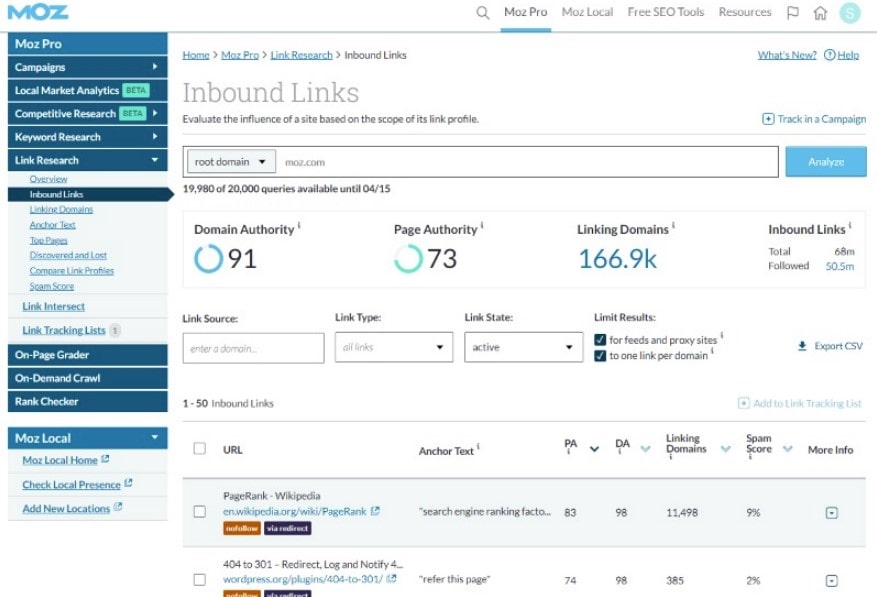
Evaluating backlink analysis requires a sharp awareness of how well-known SEO tools such as Semrush and Moz enable a comprehensive knowledge of the link profile of a website. Both tools have great ability to create backlink plans but use distinct approaches and have various features.
Leading with its Backlink Analytics tool—which provides a thorough and open picture of the backlink profile of a website—Semrush leads Semrush offers whether it’s a manufacturing corporation trying to track rivals or a fashion blog looking for premium links:
- A thorough dissection of IP addresses and referral domains.
- Learn about follow and nofollow links.
- Distribution of Anchor Text
- Link properties including type, platform, and geolocation.
Moz is revered, meantime, for its Link Explorer. This tool delves deeply into connection data and stands out for:
- A private Spam Score to weed out poor-quality connections
- Clear perspective of page and domain authority measurements
- Recently discovered and lost connecting domains
- Learn about top pages, anchor text, and linking domains.
Semrush’s thorough study might be valuable for a tourism agency trying to rank higher in searches, for instance; an online learning platform could welcome Moz’s more simplified measurements.
In essence, depending on particular needs and specialty requirements, Semrush and Moz’s backlink analysis decision would differ. Semrush offers a strong data-centric approach, whereas Moz fits different consumers since it combines simplicity with an understandable dashboard. Whether they are small mom-and–pop stores or global software giants, both of these applications include significant tools for monitoring backlinks catered to various company needs.
Compare Site Audit Capabilities in Semrush and Moz
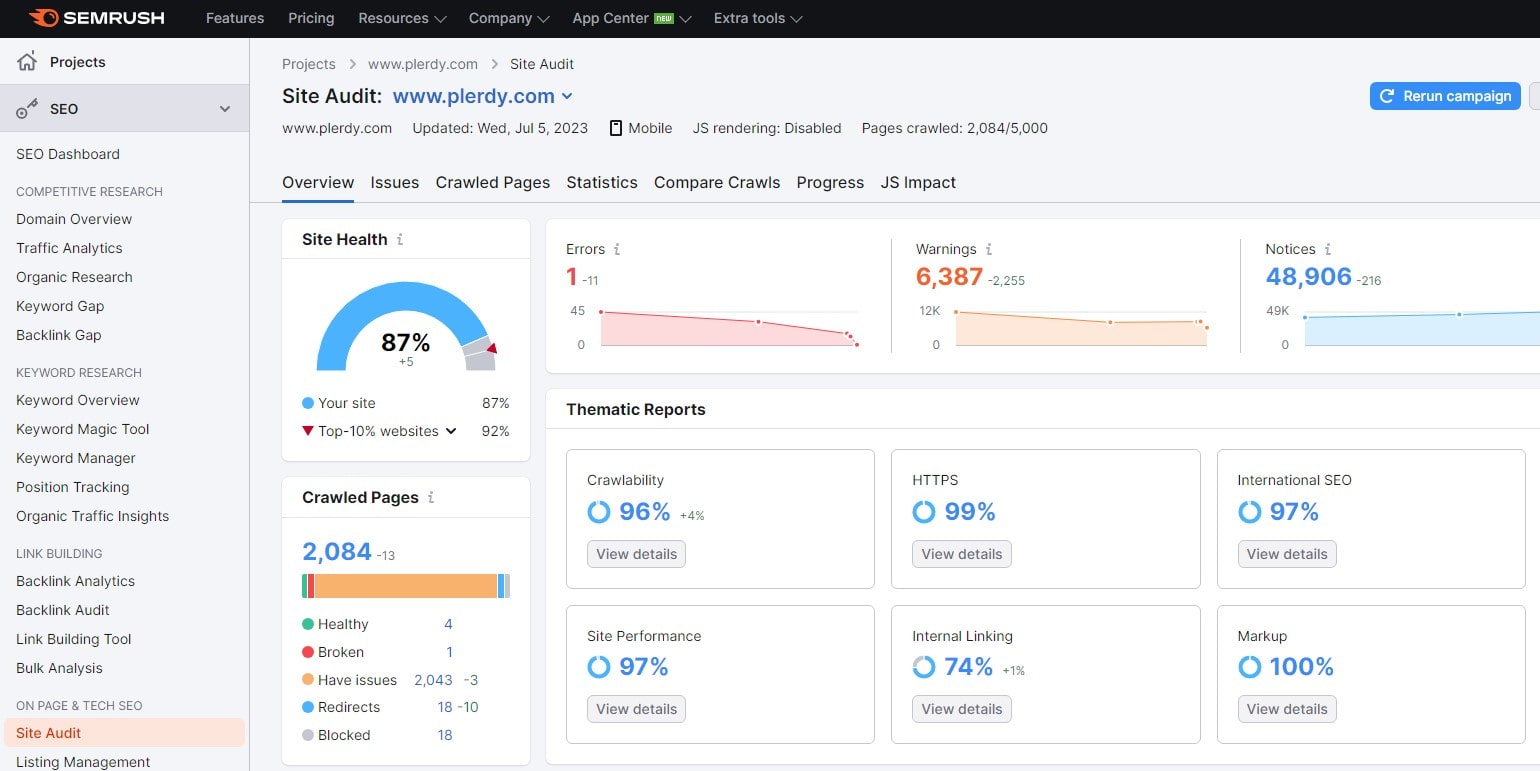
When comparing Semrush’s and Moz’s site audit features, one discovers an interesting analysis of how well these two SEO tools find and fix website problems. Though respective methods address different requirements and situations, both are meant to provide pragmatic insights.
With its Site Audit tool, Semrush offers a thorough investigation in several spheres, including personal blogs or e-commerce sites. Its features comprise:
- More than 130 inspections for SEO problems
- Give warnings and mistakes top priority.
- Core Web Vitals and other themed reports
- Strong crawling capability with JavaScript rendering
By comparison, Moz’s Site Crawl tool is renowned for its usability and accuracy. Whether it’s a nonprofit or a little startup, Moz provides tools catered to certain needs:
- fast identification of important problems including 4xx and 5xx mistakes
- Understanding duplicate content
- Concentrate on metadata including missing, long, or short titles.
- An user-friendly interface for accessibility
For a thorough investigation into technical SEO concerns, a healthcare portal with a lot of informational content might utilize Semrush; on the other hand, an independent artist’s portfolio site could find Moz’s more targeted and direct research useful.
All things considered, Moz presents simplicity and fundamental insights whereas Semrush provides a wide range of inspections and thorough analysis. The particular needs, size, and type of the website will determine which of these two SEO tools best fit them. Site audit features Semrush and Moz provide strong choices to guarantee a healthy, well-optimized website, whether it’s a digital news agency aiming for speed or a local boutique desiring to clean up duplicate material.
Look into Competitor Analysis in Semrush and Moz
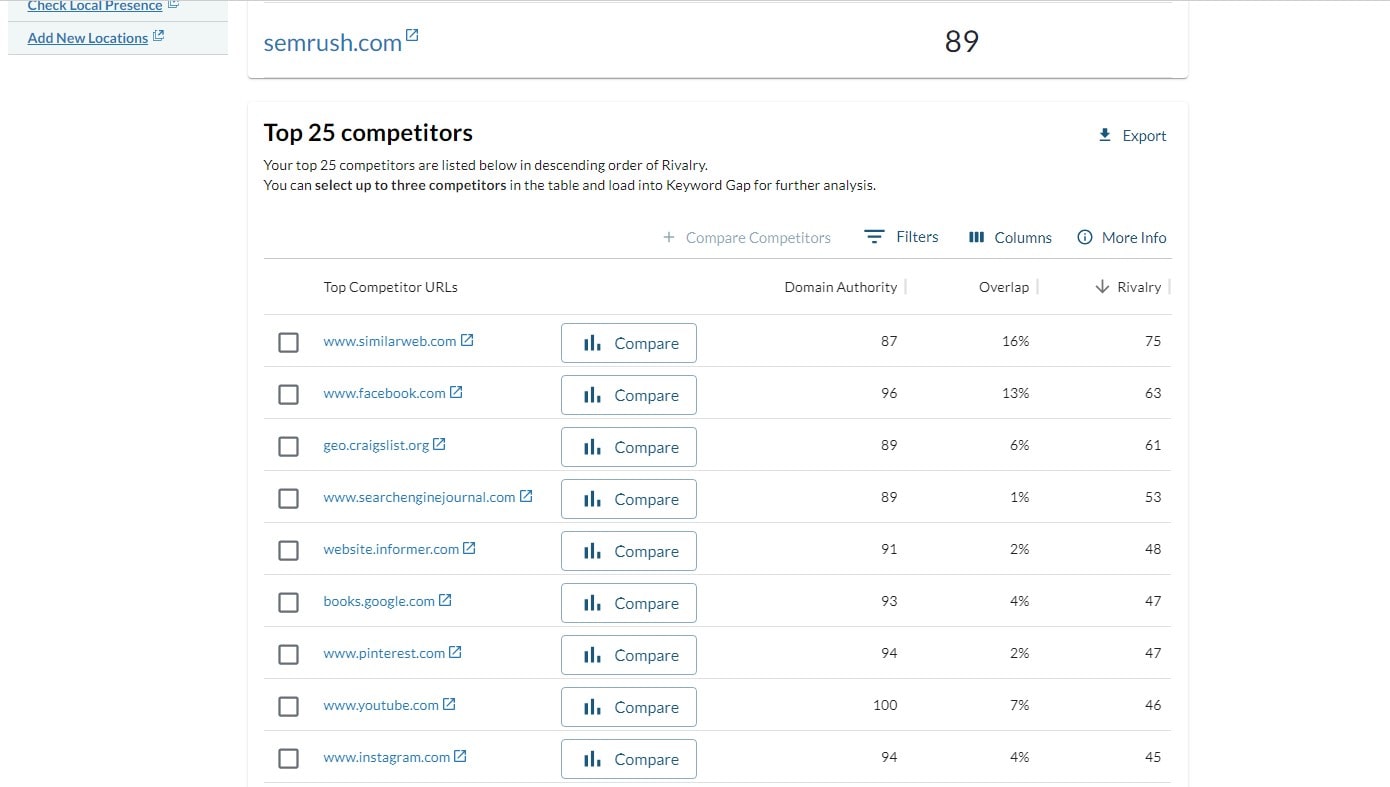
Examining rivals is like opening a wealth of knowledge, and both Semrush and Moz are great weapons in this sense. They stand out because of their capacity to break out, examine, and display actionable competitor data sets; nevertheless, they also satisfy distinct industries and needs with special characteristics.
For companies like software startups, online stores, or content creators—Semrush, known for its vibrant and all-encompassing approach—is a go-to tool. Among its competition analysis tools:
- Traffic analysis helps to grasp competing website performance.
- Market Explorer to identify trends and rising market players
- Competitive Positioning Map will help you see your place.
- Direct face-off side-by-side domain comparison
Smaller companies, neighborhood stores, or niche bloggers sometimes choose Moz because of its simplified and user-friendly style. Its unique strengths in competition analysis consist in:
- Competitor overlap for knowledge of common keyword ranks
- SERP Examining search result page diving
- Link Intersect to find areas of rival link earning success.
- Complete assessments such as Domain Authority to evaluate competitiveness
Think of an organic food company trying to raise its market share. While Moz might provide more easily available details on where the competitors rank and where they get their links, Semrush would enable an in-depth study of competitors’ market positioning and performance.
Ultimately, with their different appeal and approach, Semrush and Moz both help to provide strong competitor analysis. Semrush is perfect for businesses trying to rule their field and is meant for a whole perspective. Moz, on the other hand, offers targeted insights and fits people who want a more exact, well chosen approach. One of these SEO tools for competitor analysis will be perfect for you whether your business is a little bakery trying to stand out above neighborhood competition or a high-end fashion company against industry giants.
Check Content Marketing Tools
Content marketing covers so many various fields, hence versatile and adaptable tools are quite important. Two SEO powerhouses with interesting content marketing tools—Semrush and Moz—have different capabilities meant to meet different needs and businesses.
Semrush arrives armed with a suite of content marketing tools offering digital marketing companies, e-commerce sites, or even travel blogs comprehensive insights and practical advice. characteristics include:
- Content Audit to assess your material;
- SEO Writing Assistant for creating SEO-friendly content;
- Topic Research to find popular subjects and audience interests;
- Track content performance in post-tracking.
Conversely, Moz is a recommended pick for local companies, non-profits, or health and wellness websites since it emphasizes easy and efficient features. Its tools for content marketing mostly center on:
- Keyword Explorer for best keyword focusing;
- Link Explorer for knowledge of worthwhile link prospects;
- MozBar for fast on-the-go SEO measurements;
- On-page optimization tips for content fine-tuning.
Take a look at a fitness blog trying to produce engaging material. From topic identification to performance monitoring, Semrush can provide a wide spectrum of tools to direct the content development process. To improve the quality of his work, Moz would, on the other hand, offer targeted insights on keywords, links, and on-page features.
Both Semrush and Moz essentially offer strong tools for content marketing; Semrush offers complete and multifarious solutions while Moz stresses simplicity and accessibility. These SEO tools can transform content marketing efforts into successes catered to particular strategies and aspirations, depending on the niche, size, or special aims. Whether it’s a small gardening site wanting to inspire or a big financial company aiming to educate clients.
Examine Reporting Options in Semrush and Moz
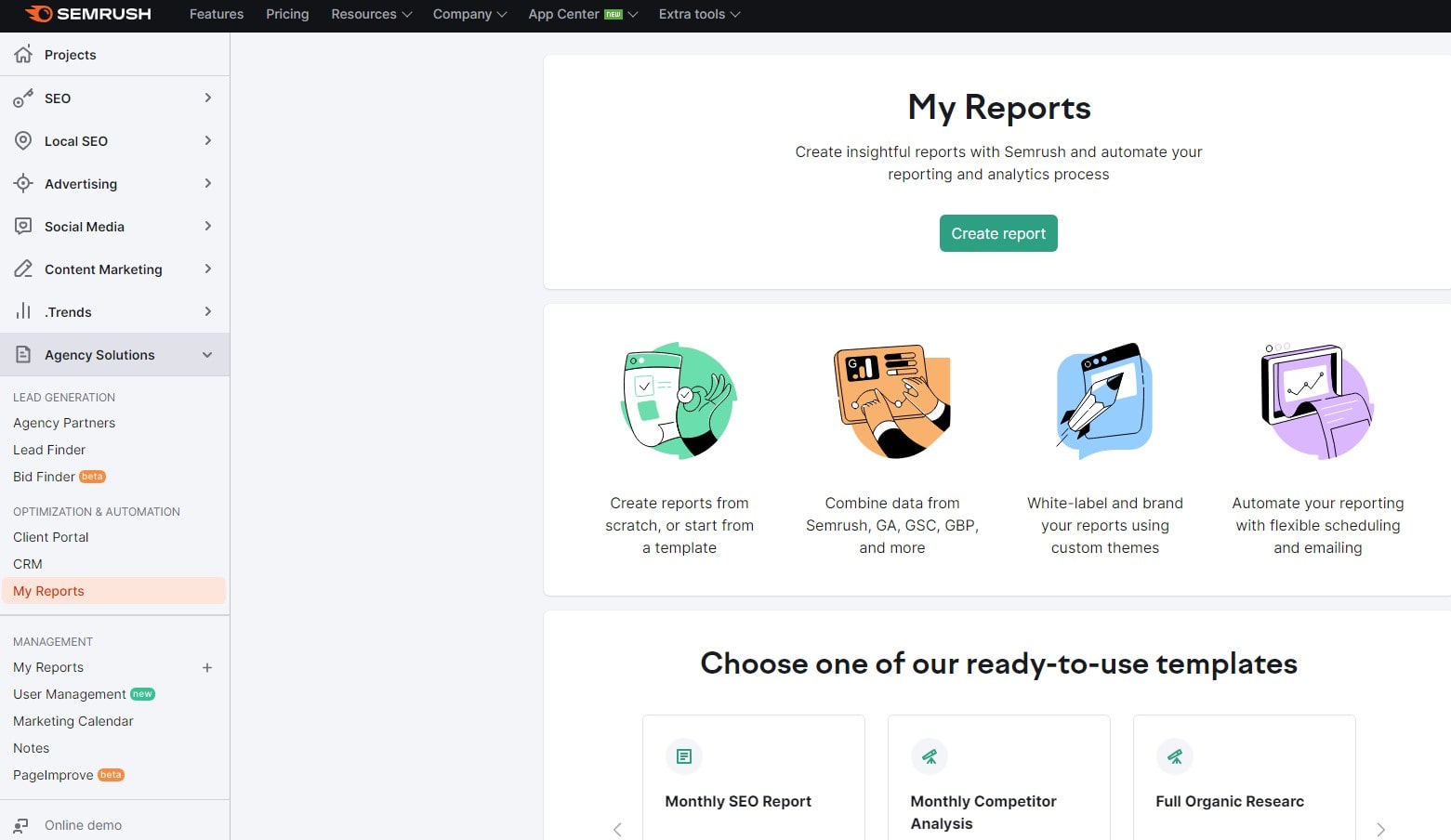
Analyzing Semrush and Moz’s reporting choices illustrates how flexible and strong these SEO tools are in turning complicated data into practical insights. Although both systems have thorough reporting tools, each has a different approach that fits different sectors and requirements.
Enterprise-level companies, big-scale e-commerce platforms, and digital marketing firms all seem to select Semrush—known for its wide range of customized reporting choices—especially. Important elements consist in:
- Customizable dashboards for fitting reports
- In line with Google Analytics and Search Console
- Export choices ranging from PDF to Excel.
- Planned reports for quick updates
Moz, emphasizing simplicity and clarity, fits small and medium-sized companies, the education industry, and community-driven initiatives. Its choices for reporting include:
- Pre-made report forms for rapid analysis.
- Link statistics and keyword ranking tracking
- Complete awareness of site SEO performance
- Simple ways of sharing with interested parties
Consider a worldwide automobile brand looking for minute details and unique reports; Semrush’s range of customisable dashboards and integrations could be the best answer. A community library seeking for clear and succinct insights could find Moz’s simple reporting choices more appropriate in meanwhile.
Though their appeal differs, Semrush and Moz shine in offering useful reporting tools in general. Semrush is suitable for those needing in-depth and customized insights since it offers great flexibility and integration powers. Moz appeals to people looking for simple and easily available reporting since it stresses efficiency and clarity. From a software firm looking for development insights to a sustainable fashion brand trying to evaluate its online presence, Semrush and Moz provide reporting choices meant to turn data into decisions, so improving tactics across many spheres.
Usability and Interface in Semrush and Moz
When it comes to the usability and interface—two of the most crucial elements in the success of any SEO tool—both Semrush and Moz provide something quite different. Examining dashboard accessibility helps us to understand how these technologies satisfy different users, from e-commerce to healthcare sectors to startups to educational institutions.
Semrush’s UI is praised for its thoroughness; it has elements appealing to big companies and seasoned marketers:
- Many widgets and tools for in-depth research
- Customizable dashboards matching certain requirements
- Modern filters and choices appealing to seasoned experts
- Harmony with several systems for coherent usability
Conversely, Moz is a great fit for small companies, neighborhood stores, and those just starting out with SEO since it stresses user-friendliness and straightforward design.
- Simple navigation using a neat structure.
- Tool tips and guided tours to help newbies.
- Aesthetically pleasing design using understandable graphs and charts
- Mobile-friendly interface for continuous connection on the road
Imagine a situation whereby a top pharmaceutical company needs sophisticated analysis with great insights; Semrush’s advanced customizing could be the ideal fit. On the other hand, a neighborhood bakery looking for basic SEO advice could find Moz’s straightforward and aesthetically pleasing UI more useful.
Ultimately, Semrush and Moz both excel in their approach to usability and design but serving different target markets. Semrush’s clever and adaptable design fits the challenging needs of big companies and industry experts. Serving small businesses and SEO novices, Moz provides a more friendly platform meant for simplicity of use. Depending on the niche—be it a family-run restaurant looking for local awareness or a financial innovator striving for worldwide impact—these SEO solutions offer dashboard accessibility tailored for specific needs and skill levels.
Compare Help and Support Options in Semrush and Moz
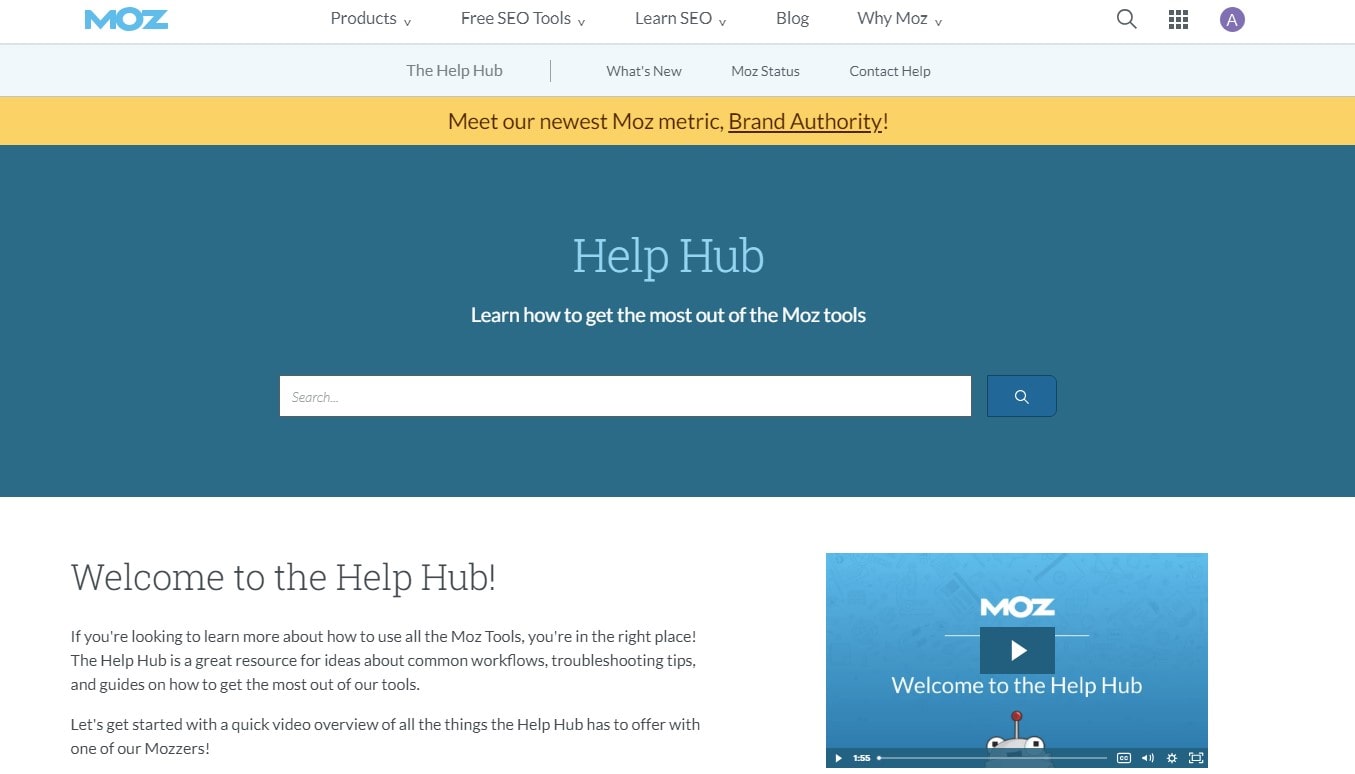
Any SEO tool’s key component is help and support options; Semrush and Moz’s products differ greatly and give special benefits to different customers. These variations can match a wide spectrum of industries, including government institutions, non-profit organizations, fashion, or automobile.
Semrush stresses on constant interaction with the user and on great help. This is clear in the assistance system meant for more ambitious projects and bigger companies:
- Round-the-clock instantaneous chat support for all inquiries.
- extensive knowledge base complete with video guides
- Webinars for education on most recent technological and software developments
- Committed help for business customers with particular requirements
Conversely, Moz tends toward community-driven support and emphasizes peer learning and teamwork heavily. Small companies, freelancers, and startups in particular find great resonance in this strategy:
- Moz Community forums for peer-to–peer help
- Frequent Q&A calls with SEO professionals
- Comprehensive instructions and learning materials for self-paced training
- Email help with informed and attentive staff
Let’s explore some useful ramifications of these variations. Think of a fast-paced digital start-up ready to leverage group industry knowledge; Moz’s community-driven strategy could be perfect. Semrush’s 24/7 live chat and enterprise-specific help would be more suited for a worldwide automobile manufacturing in need of detailed support for complex initiatives.
Semrush provides essentially a strong and practical support system fit for companies needing continuous help and specialized solutions. With its community-centric approach, Moz builds an atmosphere encouraging cooperation and self-learning. These different support systems fit different needs and provide an advantage to marketers of any kind or size of company.
Investigate Online Community Engagement
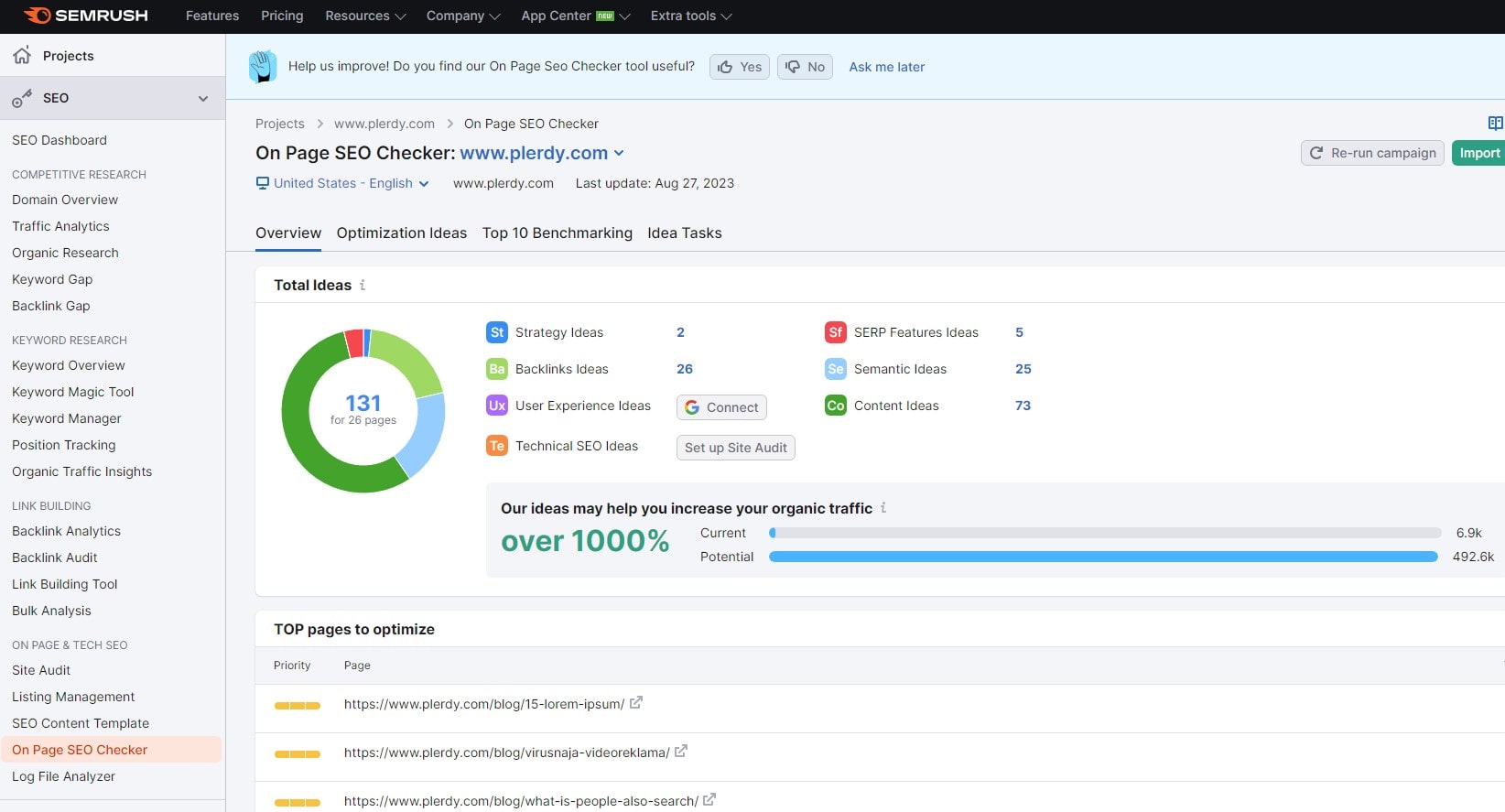
Engagement in online communities becomes increasingly important in the fast growing digital terrain. Leading search engine optimizers like Semrush and Moz have developed creative routes for companies to delve deeply into community interactions, thereby providing insights that enable brands to develop closer relationships.
Consider the business of fitness, for instance. Semrush lets personal trainers, gyms, and wellness coaches use it to:
- Examine fitness enthusiast social media trends.
- Track interaction with dietary guidelines or exercise DVDs.
- Find people connected to their target market.
- Track instantaneous responses to athletic challenges or events.
By means of tailored content tactics that meet the interests and demands of their audience, this information helps fitness experts create loyalty and retention enhancement.
Conversely, Moz shines at monitoring forums and online forums—a crucial ability for sectors such technology and gaming. Employ Moz to:
- Track forums for popular software or product problems.
- Examine user-generated material to identify future technological needs.
- Engage online communities via backlinks and conversation threads.
- Learn about the community management techniques of rival companies.
This data can enable technology companies to promote themselves as thought leaders in their sector, quickly address consumer issues, and direct product development.
Finally, Semrush and Moz are strong allies that change how companies interact with online communities rather than using technologies. Through exploring social media or online forums, companies may better grasp the pulse of their audience, create relevant material, and build close relationships. Semrush and Moz are rethinking community involvement in the digital era, therefore transforming both tech-savvy consumers and fitness enthusiasts into indispensible tools for modern marketers.
Pricing and Plans Semrush and Moz
| Feature | Semrush | Moz |
| Beginners | Pro: $129.95 | Standard: $99 |
| Intermediate users |
Guru: $249.95 | Medium: $179 |
| Advanced users |
Business: $449.95 | Large: $299 |
| Agencies | – | Premium: $599 |
| Details of the plan | While Pro is for newbies, Business covers the needs of enterprises. | Starting off with the cheapest plan is best, while large marketing companies choose the most advanced. |
| Discounts | Save 17% annually | 20% cheaper annually |
| Free Trial | 7 days | 30 days |
Review Subscription Levels
In the field of digital marketing, knowledge of the several membership rates of well-known SEO tools such as Semrush and Moz is crucial. These systems satisfy different user needs from small businesses to big companies by including several subscription levels.
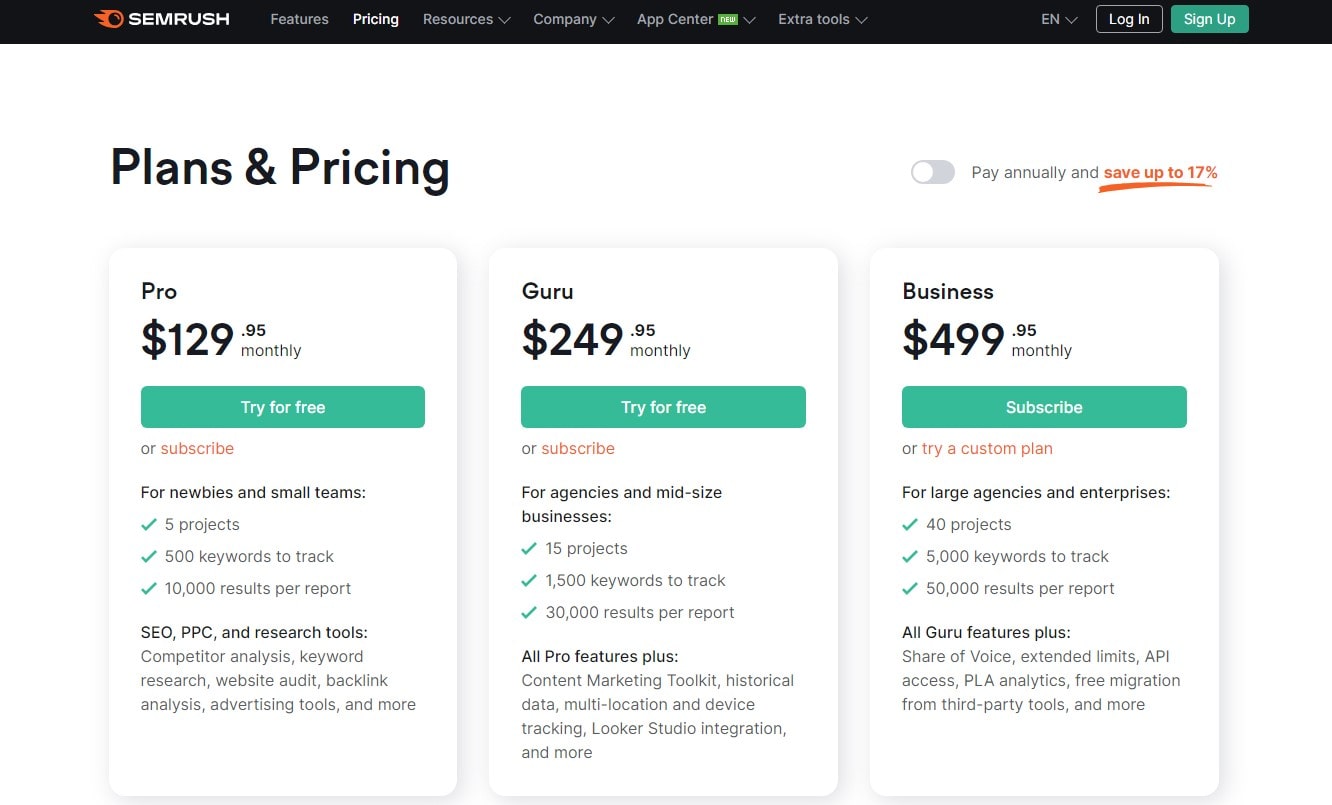
Semrush Subscription Tiers:
- Pro: Designed for startups and independent contractors, the Pro subscription lets users handle social media, create marketing reports, and provides a reasonable set of keyword and domain statistics.
- Guru: Targeting mid-sized companies, the Guru level comes with branded reports, historical data, and expanded analytical restrictions. Marketing firms handling several clients might find this level appropriate.
- Business: Designed for companies with large web properties, e-commerce initiatives, and agencies, this membership provides API access, Google Data Studio integration, and extended sharing possibilities.
Take the hospitality sector, which mostly depends on web presence. The Pro subscription would be valuable for a small boutique hotel maintaining its social media accounts and knowing visitor internet activity. To manage significant digital analytics, a national chain would probably choose the Business tier instead.
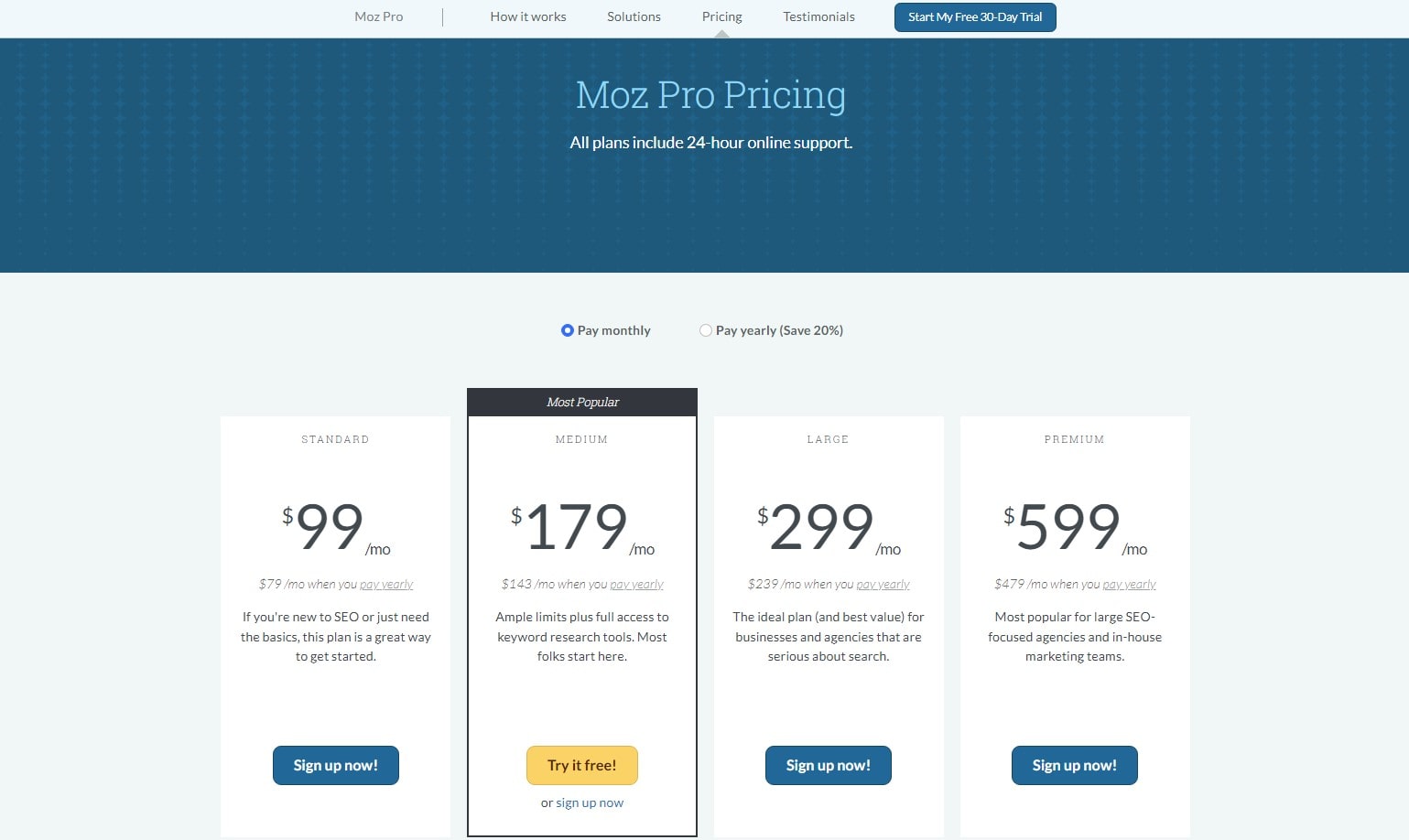
Moz Subscription Tiers:
- Standard: Perfect for local companies, this one offers the basics including site crawling and keyword research.
- Medium: Designed for expanding companies and marketers, the Medium plan enhances the features with more searches and reports.
- Large: Targeting large-scale companies and agencies, this level offers personalized reports, more tracked keywords, and larger data allowances.
For instance, while a publishing company would choose the Large subscription to move its varied portfolio, an independent bookstore might follow the Standard plan to maximize local SEO.
Finally, Semrush and Moz have developed subscription rates fit for different corporate requirements. Understanding these tiers helps marketers and SEO experts select the toolkit most appropriate for their budget and approach, thereby optimizing the results of their online activities.
Consider Free Trial and Money-Back Guarantees
Looking at SEO tools, it’s wise to investigate free trial durations and money-back promises. Both Semrush and Moz provide choices that let users test-drive their solutions free from immediate payment commitment. These presents stack like this.
Semrush:
- Free Trial: Most Semrush’s paid memberships come with a free 7-day trial, during which time users have access to all the tool’s capabilities—including keyword research, site audit, and competitor analysis.
- Money-Back Guarantee: If you’re not happy, Semrush offers a 7-day money-back guarantee on any subscription, therefore enabling a complete return should the tool fail to live up to your expectations.
In the automotive sector, for example, a vehicle dealership can use the free trial to assess rivals’ advertising campaigns and make data-driven decisions free from budget impact.
Moz:
- Free Trial: On its Medium plan, Moz gives a more liberal 30-day free trial. This covers link research, keyword tracking, on-page SEO tools.
- Money-Back Guarantee: Similarly, Moz offers consumers starting a subscription piece of mind with a 30-day money-back guarantee.
Think of a non-profit focused on environmental issues. Using Moz’s free trial, they might increase their online advocacy and spend a month free exploring optimization methods.
Semrush and Moz’s free trial and money-back guarantees basically reduce risk by themselves. They let possible consumers have a hands-on experience, which is essential for knowing how these technologies may be very helpful in promoting success in many different sectors. Whether it’s the hotel industry or e-commerce, these offerings create a commitment-free atmosphere that promotes discovery, thereby ensuring that the investment fits corporate objectives and expectations. Choosing these solutions will help companies and professionals to precisely improve their digital strategy by finding the ideal match in the sea of SEO tools.
Exploration of Tool Compatibility With Other Platforms
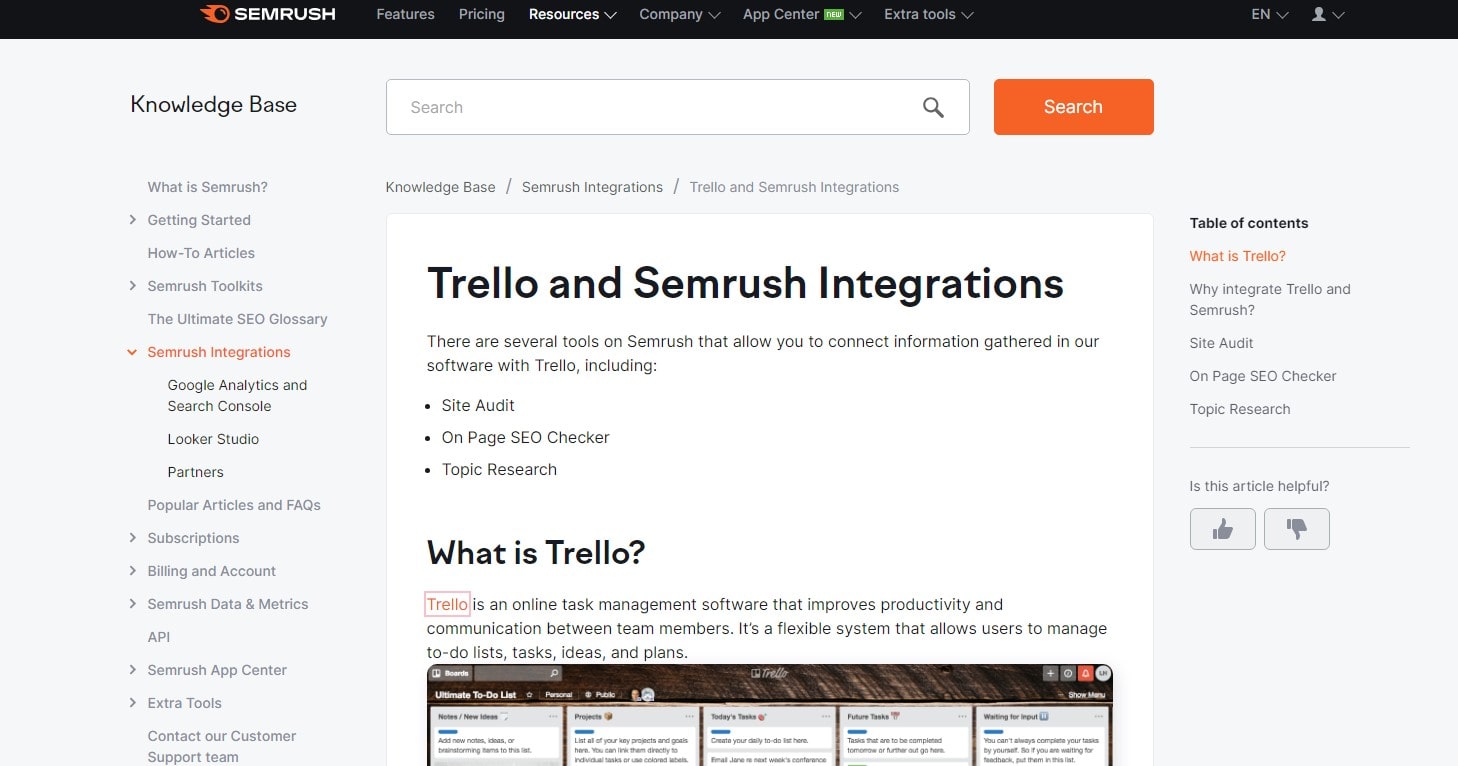
Evaluate Integration Options
Maximizing the value of SEO technologies depends critically on integration with other systems. Semrush and Moz provide numerous integration choices that let companies in different areas simplify their procedures and base judgments on data.
Semrush:
- Retailers especially value Google Analytics and Google Search Console Integration since it allows you to get data straight-forwardly, thereby enabling a quick audit of site performance.
- Digital marketing firms sometimes employ Trello Integration to efficiently handle their SEO responsibilities, therefore aggregating all their operations under one roof.
Moz:
- Popular in the healthcare industry, Google Data Studio Integration lets Moz’s data be combined with other sources, hence enabling thorough reporting.
- Integrating Slack: Because it maintains the team on the same page with real-time information on tracking and rankings, tech startups find this integration valuable.
While a university using Moz might lean into Slack Integration for consistent departmental communication on keyword performance, a real estate company using Semrush could use Google Analytics integration to precisely analyze visitor behavior.
Knowing and choosing the appropriate integration solution will help companies to easily include SEO technologies into their current process. Choosing the correct connections opens the path for an ideal, all-encompassing SEO strategy whether it’s Semrush’s connection with Trello that can offer simplified task management or Moz’s fit with Google Data Studio that can improve analytical insight.
Assess Mobile Accessibility
In the digital terrain of today, mobile accessibility is first priority; thus, Semrush and Moz are leading the charge by making sure their platforms are mobile user friendly. From a mom-and– pop bakery trying to increase its online presence to a multinational conglomerate wanting to extend its worldwide sphere of influence, any company depends on accessibility on mobile devices.
Strong elements provided by Semrush and Moz help to enable mobile optimization:
Semrush:
- Mobile performance testing helps companies like fitness centers to check their websites so that members may access schedules and booking on their smartphones.
- News organizations sought-after Accelerated Mobile sites (AMP) monitoring for fast-loading sites, therefore boosting readership.
Moz:
- Essential for e-commerce systems tracking their product page ranks on mobile search results is mobile ranking tracking.
- Travel bloggers highly value on-page optimization for mobile to ensure their audience may easily get travel advice and guides on tablets and smartphones.
These tools serve many industries with particular demands. For example, Moz’s mobile ranking tracking helps a fashion merchant analyze product popularity on mobile devices; a tech blog may use Semrush’s AMP monitoring to make sure their stories load quickly.
Including these elements into a coherent mobile approach increases user involvement and experience. Semrush and Moz are essential friends in negotiating the complex maze of mobile accessibility, allowing companies to reach out, connect, and effectively convert on-the-go people depending more and more on mobile devices.
Educational Resources and Training in Semrush and Moz
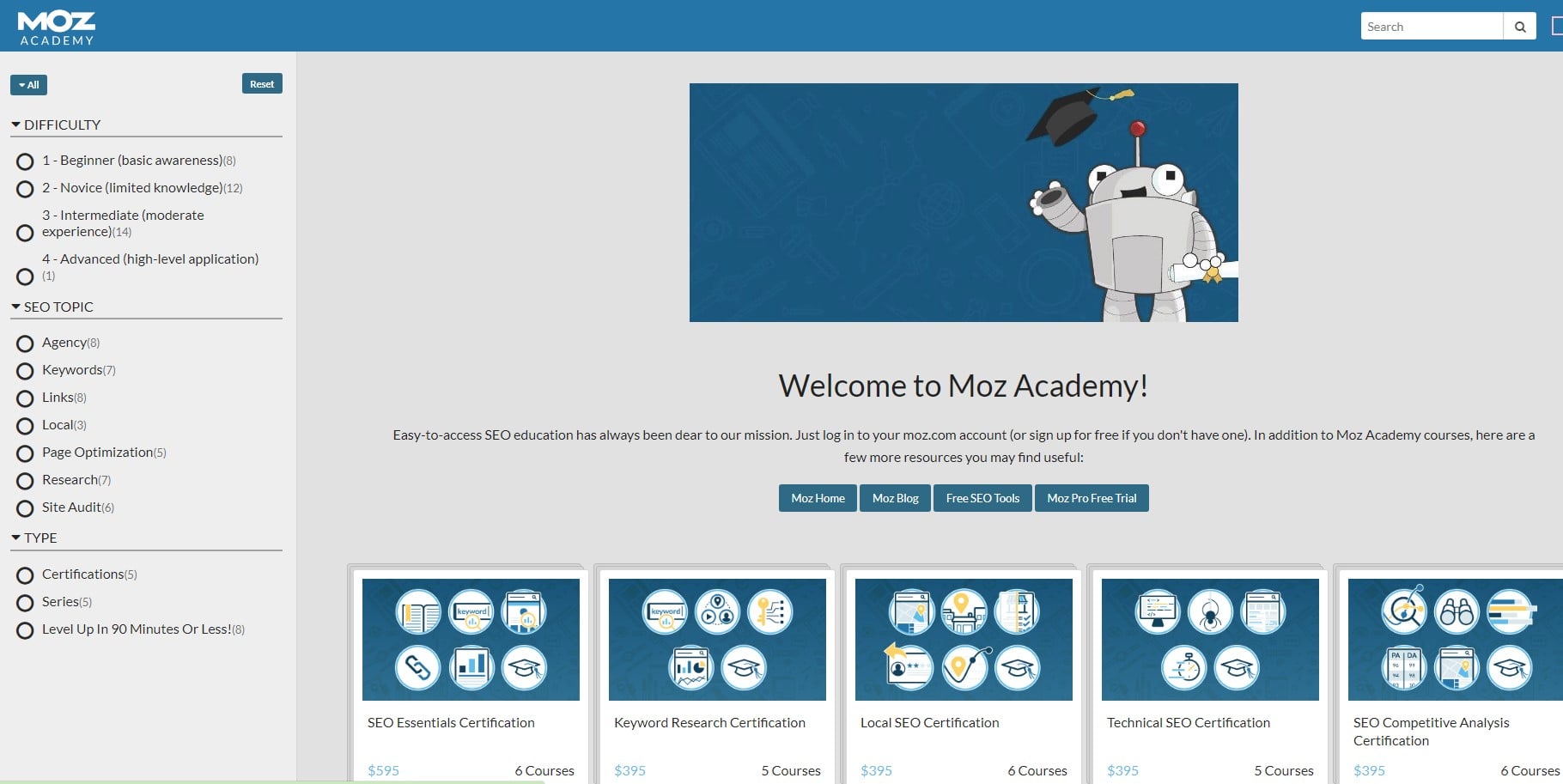
Compare Available Training Resources
High-quality training resources are much needed in the ever-changing field of search engine optimization. Semrush and Moz are two main platforms that provide a lot of instructional support to enable people and companies succeed in their SEO activities. The training materials these powerhouses offer are thoroughly compared here.
Semrush:
- Academy: Provides a large range of online courses and certificates suited for many sectors including real estate and healthcare.
- Webinars: Regular interactive seminars with top SEO professionals can help niches like IT entrepreneurs.
- Ebooks and Guides: Offer in-depth information for self-paced learning, which is preferred among single entrepreneurs.
Moz:
- Beginner’s Guide to SEO: Popular with small enterprises, is a thorough overview dissecting SEO for beginners.
- Moz Academy: Appreciated by marketing firms, includes hand-on learning video lectures and quizzes.
- Community Q&A: Encouragement of users to delve into SEO via an active online forum helps to support networking and peer-to-peer learning by means of this process.
One excellent illustration of how these tools might help particular niches would be an e-commerce firm. Semrush’s academy will help them understand online retail SEO; Moz’s Community Q&A can provide tailored answers to certain problems.
On the other hand, a seasoned search engine optimist dealing with worldwide companies might rely on Moz’s comprehensive video lessons to hone their skills or use Semrush’s webinars for advanced techniques.
Semrush and Moz differ mostly in their dedication to democratizing knowledge. They create competence rather than only provide tools. These sites provide a road to learn SEO, regardless of the environment, whether your company wants to grow up your SEO or you’re an aspirant blogger trying to grasp the fundamentals and need different levels of expertise.
Check for Regular Webinars and Updates
Maintaining current with the most recent tactics, techniques, and strategies is crucial in the ever changing terrain of SEO. Semrush and Moz both understand this need and provide monthly webinars and updates to make sure companies in many sectors remain current with the often shifting SEO scene. With this educational-driven strategy, let’s investigate how they serve different industries.
Semrush’s Regular Webinars and Updates:
- Webinars: Targeting niches like hospitality, Semrush provides expert-led webinars breaking out the complexity of SEO for hotel chains thereby guaranteeing their online exposure.
- Tool Updates: Semrush regularly releases changes to its SEO tools, including the addition of social media tracking for influencers so users may keep ahead of digital trends.
- Industry-specific Insights: Particularly related to industry Insights: Semrush offers well chosen guidance to assist bloggers increase their audience based on knowledge of the food blogging scene.
Moz’s Regular Webinars and Updates:
- Webinars: Moz’s webinars, which often target non-profits, offer special SEO techniques to raise visibility and donations.
- Tool Updates: Help Moz make sure legal businesses, for example, can negotiate the complex terrain of legal SEO by always improving its toolkit.
- Community-driven Learning: Moz creates an atmosphere where healthcare professionals may remain in line with best practices and learn from one another motivated by community.
Consider the automobile sector here. While Moz’s webinars can teach automotive stores how to leverage local SEO, Semrush’s product improvements let them monitor customer behavior.
Alternatively think about a startup in education. While Moz’s community-driven learning can promote peer-to–peer cooperation and creativity, Semrush’s industry-specific analytics can help them in advertising online courses.
Semrush and Moz close the distance between modern tactics and success of tomorrow. Regular webinar and update offers help companies to remain on the cutting edge, thereby promoting development and adaption in many different sectors. It’s about prospering in an always changing environment, not only about using SEO techniques.
Analyze Customer Reviews about Semrush and Moz
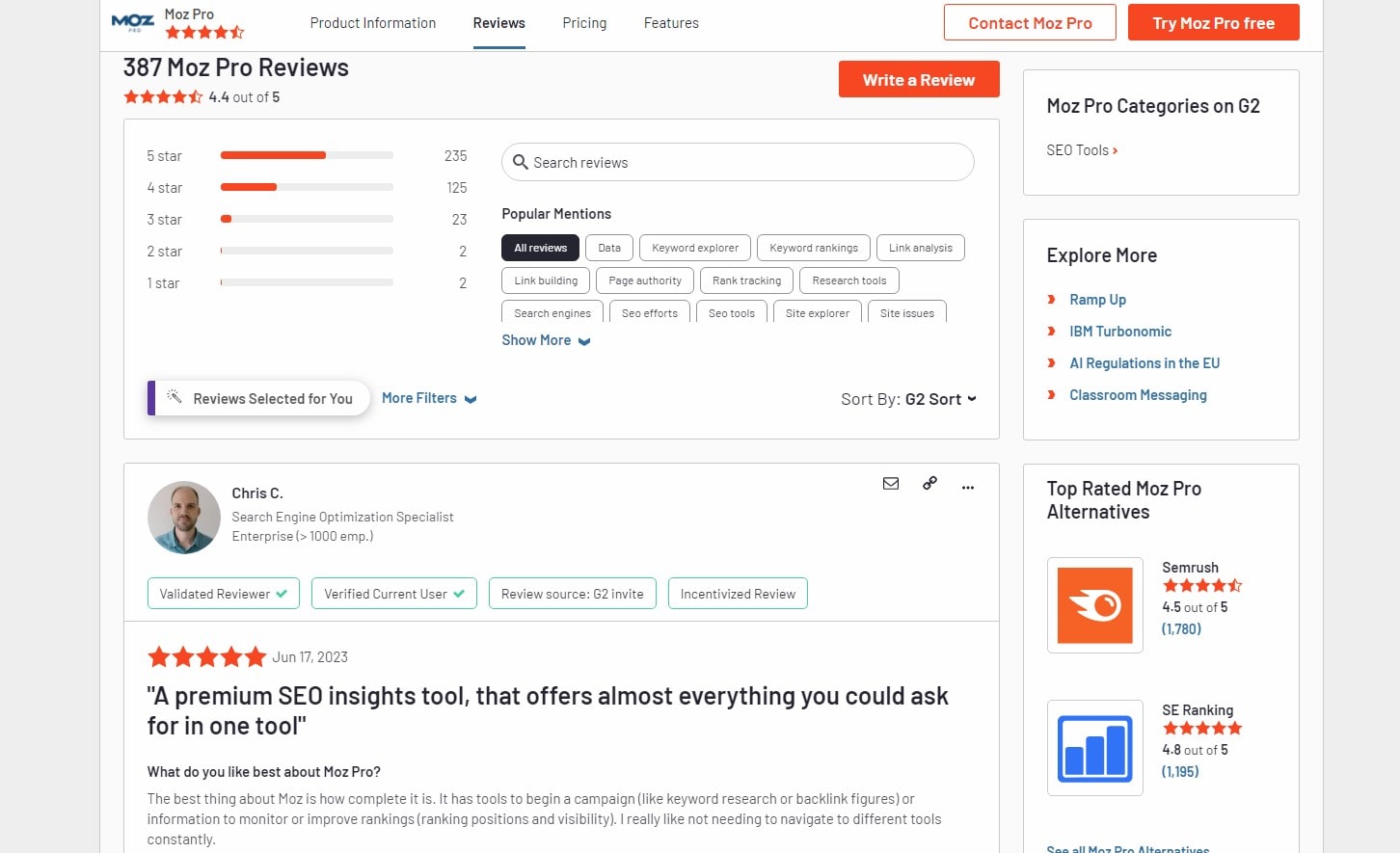
Customer reviews mirror the performance and reputation of a brand in the fast-paced digital terrain. Tools like Semrush and Moz, which are meant to gather, analyze, and apply reviews for improving the SEO strategy of your company, have made consumer feedback analysis easier. Let’s explore how these technologies enable different niches to grasp and act upon consumer reviews.
Semrush for Customer Review Analysis:
- Online Retailers: Semrush lets e-commerce businesses identify reviews influencing their product listings. Their observations help stores to properly answer client questions.
- Restaurants: Can use Semrush to examine customer comments and change their menu or service in line, therefore promoting good ratings to the top.
- Travel Industry: Travel agencies use Semrush to compile comments from several sites, thereby making sure their offers satisfy consumer expectations.
Moz for Customer Review Analysis:
- Healthcare Providers: Moz gives doctors a forum to answer patient feedback, so helping them to keep openness.
- Local Businesses: Small local companies use Moz to compile evaluations from several websites, therefore enabling their awareness of community needs and preferences.
- Technology Firms: Moz’s strong analytics will enable technology firms to filter and evaluate product reviews, thereby promoting constant development.
Imagine a situation whereby a real estate company wants to raise the caliber of its offering. Semrush can give an analysis that results in more customized experiences for customers and scrape reviews from several portals. Likewise, a pet caretaker may use Moz’s platform to evaluate comments from pet owners and adjust their offerings.
Semrush and Moz translate consumer reviews into useful information. These tools help companies to grasp the voice of their consumers, whether it is tracking attitudes in the fashion sector or monitoring comments for an online exercise platform. Constant monitoring and rigorous analysis enable them to assist create content, goods, and services that appeal to target markets. In a sea of competition, standing out calls for accepting customer comments; these tools offer the exact compass to lead to success.
Assess Industry Recognition and Awards Semrush and Moz
In the cutthroat sector of SEO, industry recognition and awards are rather important markers of a tool’s quality and performance. Semrush and Moz are two tools that really shine often. Their thanks not only highlight their effectiveness but also lend credibility in many different domains.
Acclaimed as a top SEO tool, Semrush has won the US Search Awards and European Search Awards. The power of the tool spans several spheres:
- Healthcare: Semrush has been embraced by marketers in the sector for competition analysis.
- Retail: Notable for e-commerce optimization and product listing ads.
Conversely, Moz has established his niche by concentrating especially on keyword research and link analysis. It excels in several fields and has compliments from leading business executives.
- Finance: Financial analysts have praised Moz’s link-building strategies.
- Education: On-page SEO features of Moz have helped educational institutions.
For Semrush as well as Moz, the accolades and industry validation include:
- Semrush:
- The UK Search Awards named the company’s 2019 software bundle as the best.
- Several honors for tools in content marketing and PPC.
- Moz:
- Known for Whiteboard Friday, a series of instructional videos.
- Recognized for open policies and community involvement.
Evaluating these honors and accolades helps prospective users more precisely balance their choices. Whether you are an established organization attempting to improve your online strategy or a startup trying to enter the market, knowing these industry awards helps you to link the tool choices with personal ambitions and aspirations.
Semrush and Moz: Consider Your Specific Needs and Preferences
One excellent approach to establish credibility for your business is to get compliments and honors from colleagues in your field of work. In the field of SEO, Semrush and Moz have become rather popular tools for their creative qualities as well as for their esteemed reputation. Let’s evaluate how these accolades influence the attractiveness of these tools in several markets.
Semrush’s Industry Recognition:
- Given its thorough analytics and insights, Semrush—which received “Best SEO Software”—has become the preferred tool for digital marketing firms.
- Start-ups in the tech sector value Semrush’s forward-looking tools and capabilities for innovation.
Moz’s Industry Awards:
- Get “Top-Rated SEO Tool”. Accolade: One great way to prove your company is a leader in its industry is by having rivals in your area acknowledge you.
- Appreciated for customer service: Local companies find Moz’s customer service excellent, which results in many praises in this field.
Imagine a situation whereby an educational platform requires an SEO tool. They evaluate the prizes and discover Semrush to be the “Best Educational Content Creator”. This awareness will help them decide Semrush is better than alternative tools. Likewise, a tiny online store can choose Moz based on its award-winning customer service to guarantee assistance as their company grows.
Leading players in the SEO scene, Semrush and Moz have accolades indicating dedication, creativity, and excellence. Their recognitions are concrete statements of quality appealing to a wide range of companies, not just decorations. From massive e-commerce companies to emerging bloggers, these prizes help to establish confidence and preference and tell volumes about the dependability and efficiency of these remarkable tools.
Encourage Testing Both Tools for Personal Assessment
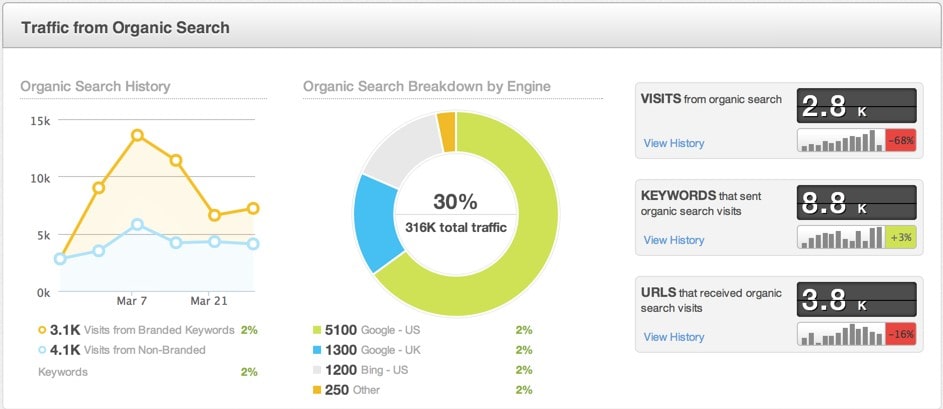
Two tools that really stand out for their functionality and dependability in the varied terrain of SEO are Semrush and Moz. It is not always clear, nevertheless, which tool fits a certain company’s special requirements. Personal testing then becomes rather important since it provides priceless information to guide decisions.
One sensible strategy is to promote testing both Semrush and Moz. Whether a tiny business owner or a seasoned marketer, it enables people to assess these tools in the framework of their own operations and goals. Here is how testing both can help several niches:
- Digital Marketing Agencies:
- Semrush: Review the competitive intelligence backlink analysis capability.
- Moz: Check keyword tracking to match client objectives.
- E-Commerce Platforms:
- Semrush: Test content marketing tools for besting product descriptions.
- Moz: Look at local SEO solutions to increase area sales.
- Startups & Entrepreneurs:
- Semrush: Look at market research and industry trends.
- Moz: Explore on-page search engine optimization tools to improve site performance.
Promoting this practical research increases confidence. A blogger emphasizing organic cuisine, for instance, may use Semrush’s content optimization tools, while Moz’s link explorer might appeal to a technical website. Through experimenting with these tools, users develop their knowledge of the dynamics and features, therefore selecting the tool that fits their particular corporate needs.
Recall, the SEO tool business does not have a one-size-fits-all solution. Semrush and Moz provide strong, different answers. Promoting the testing of both guarantees a customized knowledge, which results in a decision best suited for personal objectives and business requirements.
Finish
Within the complex terrain of SEO, the conflict between Semrush and Moz has piqued the curiosity of SEO experts and digital marketers all over. We have explored a side-by- side comparison of these two giants, highlighting salient observations on features, user experience, and cost structures.
- Semrush: Perfect for its adaptability and rich analytics, this all-in-one tool offers backlink analysis, keyword research, and competitive spying among other things.
- Moz: Moz truly excels in on-page optimization and link quality measures, known for its simple UI and efficient link disavowal tools.
Whether someone or a business chooses Semrush or Moz depends on their particular needs, available money, and taste. Semrush may be your go-to tool if comprehensive keyword research and customizing speak to your approach. On the other hand, Moz might fit better if you give user experience and link quality indicator top priority.
But the narrative goes deeper! Plerdy tool provides unique insights and practical advice to improve the performance of your website for people who wish a more sophisticated knowledge of SEO & UX analysis. This is the moment to seize this chance and improve your approach of digital marketing. Think about signing up for Plerdy to help you negotiate the next phases of your search engine optimization path. You will find great value in this choice for the outlay.
